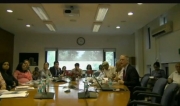Building on Asia’s Strengths during Turbulent Times
A discussion around the IMF’s Spring 2016 Asia and Pacific Regional Economic Outlook
A conversation around the IMF’s Spring 2016 Asia and Pacific Regional Economic Outlook (REO), Building on Asia’s Strengths during Turbulent Times, led by Dr Thomas Richardson, Senior IMF Resident Representative in India, Nepal, and Bhutan was held at NCAER, following the official release of the report today.
Asia continues to be the most dynamic part of the global economy. But it also continues to face severe challenges of a still weak global recovery, slowing world trade, and the impact of China’s growth transition. Growth in the Asia–Pacific economies is expected to decelerate slightly to about 5 percent during 2016–17. The region’s countries need structural reforms to rebalance demand and supply, reduce vulnerabilities, and augment economic efficiency to raise productivity and maintain their leadership position. Further, the pace of economic expansion must be protected from real and financial volatilities.
In his presentation, Dr Richardson discussed that a new wave of potentially high-impact reforms would help, ranging from the reform of State-owned enterprises in China, to labour and product market reforms in Japan, to infrastructure reforms in India.
Following Dr Richardson’s presentation, Dr Kanhaiya Singh, Senior Fellow, NCAER put forward his thoughts on the report from India’s perspective. The Q & A that followed the presentations led the discussions to a lot many questions pertaining to the growth of Indian economy.
The Spring 2016 Asia and Pacific Regional Economic Outlook discusses the downside risks that could potentially dim Asia’s growth prospects, and high leverage that could further exacerbate shocks, particularly in the event of an interest rate spike. While the region is better positioned to meet the challenges ahead, there is pressing need to strengthen Asia’s resilience to global risks and enhance productive capacity. The REO Update also supports accommodative monetary policy, especially where fiscal space is limited. Looking ahead, growth prospects amongst the largest Asian countries are likely to diverge, owing to a variety of factors ranging from lower commodity prices in Indonesia and Malaysia, political uncertainty also in Malaysia, weaker growth in China, a demand-driven recovery in India and a wage-driven recovery in consumption in Japan.
Thomas Richardson is the IMF’s Senior Resident Representative in India, Nepal and Bhutan. He was earlier the Senior Resident Representative and IMF mission chief in Uganda. During the course of more than 20 years at the Fund, he has served as the IMF mission chief for countries including Cyprus, Belarus and Moldova, and has worked extensively on China and Russia, including as the IMF Resident Representative in Moscow from 1995 to 1998.
Kanhaiya Singh is Senior Fellow at NCAER. His work covers a range of areas in applied economics, including macro and monetary economics, input-output analysis, CGE models, international economics, sector studies, the environment, agriculture trade, and food security. Prior to joining NCAER in 2004, he was a Deputy Director at the Tariff Commission of India in the Ministry of Industry and Commerce and worked earlier in the private sector as a mechanical and operations engineer. Singh was trained as an engineer with a BTech in mining machinery from the Indian School of Mines Dhanbad, followed by an MBA from the Poddar Institute of Management, and a PhD in economics from the Australian National University in Canberra. He is currently working on measuring the economy wide impacts of large infrastructure such as airports.
NCAER’s Looking East Dialogues are policy conversations designed to provide an opportunity for live, focussed dialogue among public policy practitioners and analysts in India and East Asia. These tightly organized video conversations at NCAER are driven by mutual interest and intellectual curiosity, with policymakers and analysts selected for their intimate knowledge and involvement in their country’s public policy experience and their own interest in learning about how Indian and East Asian policymakers are meeting similar challenges.
The complete report is available at the IMF website






